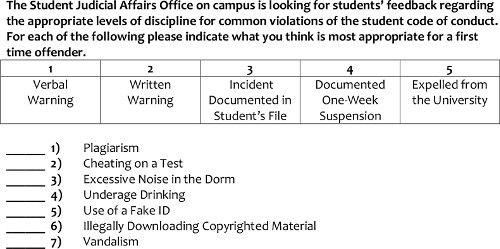Manipulating an Independent Variable through Embodiment
Source: Laboratories of Gary Lewandowski, Dave Strohmetz, and Natalie Ciarocco—Monmouth University
In any experiment, the researcher attempts to manipulate participants in one group to have different thoughts, experiences, or feelings than the other groups in the study. Some manipulations are overt, while others can be quite subtle. Embodiment is a growing research area focused on the theory that subtle physical experiences can unconsciously influence a person’s thoughts. For example if a person physically smiles, it often leads to elevated mood. That is, the physical experience of smiling changes the way a person feels.
This video uses a two-group experiment to see if the physical sensation of weight will lead people to be stricter by giving harsher forms of discipline to fellow students who violated campus policies.
1. Define key variables.
- Create an operational definition (i.e., a clear description of exactly what a researcher means by a concept) of embodiment, or embodied cognition.
- For the purposes of this experiment, embodiment, or embodied cognition, involves the participant directly experiencing the physical sensation of weight in a non-obvious way that can unconsciously influence cognitions.
- Create an operational definition (i.e., a clear description of exactly
The data were collected from 122 participants. Recall that the discipline scale is calculated on the number assigned to each of the levels of discipline (e.g., 1 = verbal warning, etc.). To determine if there were differences between the heavy and light clipboard conditions on discipline levels, we performed a t-test for independent means.
The results indicated that participants who held the heavy clipboard gave stricter levels of discipline for 6 of the 7 violations (Figure 2). The only exception wa
This two-group experiment shows how researchers can manipulate participants’ cognition in a subtle way that participants are not aware of through embodiment.
This study replicates and extends previous research on embodiment by Jostman et al., which showed that holding a weighted clipboard made participants think that fair decision-making through listening to students’ opinions was more important.1
Embodiment effects are in
- Jostmann, N. B., Lakens, D., & Schubert, T. W. Weight as an embodiment of importance. Psychological Science. 20(9), 1169-1174. doi:10.1111/j.1467-9280.2009.02426.x (2009).
- Kille, D. R., Forest, A. L., & Wood, J. V. Tall, dark, and stable: Embodiment motivates mate selection preferences. Psychological Science. 24(1), 112-114. doi:10.1177/0956797612457392 (2013).
Skip to...
Videos from this collection:

Now Playing
Manipulating an Independent Variable through Embodiment
Experimental Psychology
8.5K Views

From Theory to Design: The Role of Creativity in Designing Experiments
Experimental Psychology
18.1K Views

Ethics in Psychology Research
Experimental Psychology
29.0K Views

Realism in Experimentation
Experimental Psychology
8.2K Views

Perspectives on Experimental Psychology
Experimental Psychology
5.6K Views

Pilot Testing
Experimental Psychology
10.3K Views

Observational Research
Experimental Psychology
12.9K Views

The Simple Experiment: Two-group Design
Experimental Psychology
71.7K Views

The Multi-group Experiment
Experimental Psychology
22.7K Views

Within-subjects Repeated-measures Design
Experimental Psychology
22.8K Views

The Factorial Experiment
Experimental Psychology
73.0K Views

Self-report vs. Behavioral Measures of Recycling
Experimental Psychology
11.7K Views

Reliability in Psychology Experiments
Experimental Psychology
8.4K Views

Placebos in Research
Experimental Psychology
11.6K Views

Experimentation using a Confederate
Experimental Psychology
17.8K Views
Copyright © 2025 MyJoVE Corporation. All rights reserved
